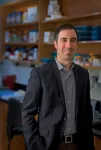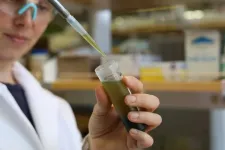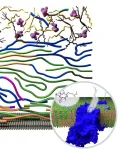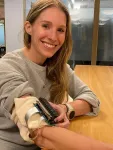(Press-News.org) Scientists at the University of Akron and the University of Pittsburgh have overturned long-held assumptions in new research that finds water can be a help for adhesion.
Dr. Ali Dhinojwala, distinguished W. Gerald Austen Endowed Chair and H.A. Morton Professor at The University of Akron’s School of Polymer Science and Polymer Engineering, lead a team whose significant breakthrough — that water can unexpectedly enhance adhesion under controlled conditions — was published Aug. 7 in Science Advances.
The implications of this research are profound, particularly in biomedical applications such as bandages, health monitoring sensors for moist skin, and advanced adhesives that could replace sutures. The insights gained into leveraging surface roughness and material properties could revolutionize industries worth billions of dollars globally.
Driving on wet roads or applying adhesive tapes to damp skin are everyday challenges exacerbated by the difficulty of achieving strong adhesion on wet, rough surfaces. Traditionally, the presence of water has been seen as a hindrance, disrupting molecular bonds necessary for effective adhesion. Water tends to cling to surfaces and get trapped in surface roughness, further complicating the adhesion process.
In a significant breakthrough, Dr. Dhinojwala’s team —including Dr. Tevis Jacobs from the University of Pittsburgh, Dr. Lars Pastewka from the University of Freiburg and Dr. Anirudha Sumant from Argonne National Laboratory —made their discovery in a study that involved measuring the adhesion of a soft elastomer to precisely engineered rough surfaces, revealing a complex interplay between water, surface roughness and adhesion dynamics.
Dr. Dhinojwala, and graduate student Nityanshu Kumar, performed the groundbreaking underwater experiments and developed models to explain the results. The rough surfaces were chemically prepared at Argonne National Lab and were characterized down to the atomic scale at the University of Pittsburgh. Simulations of the separating interface were conducted at the University of Freiburg. The investigation was only possible through the complementary expertise of this collaborative team.
Contrary to expectations, the presence of water during contact formation initially disrupts adhesion by preventing molecular contact over nearly half of the surface area due to trapped water molecules. Moreover, the energy required to deform the elastomer and conform to the surface roughness is significantly increased in the presence of water, further reducing initial adhesion.
Surprisingly, the presence of water, which disrupts adhesion during contact formation, increased adhesion by nearly four times during detachment. With the help of analytical models and surface-sensitive spectroscopy, these results showed that water is trapped in nanometer-sized pockets. “It’s hard to make contact under water because extra energy is required to squeeze out the water and you can’t remove it entirely,” said Dr. Jacobs, “But we were very surprised to see that the same trapped water that makes it hard to push two surfaces together, also makes it significantly harder to pull the same surfaces apart.”
"These findings challenge the traditional view that water universally impedes adhesion," said Dr. Dhinojwala. "By understanding how water interacts with surface topography, we can potentially harness roughness to enhance adhesion, much like how geckos use their toe pads to climb wet surfaces."
Dr. Dhinojwala’s team next intends to focus on further refining these findings to develop practical applications that capitalize on the surprising benefits of water in adhesion science.
END
New research challenges conventional wisdom on wet surface adhesion
2024-08-07
ELSE PRESS RELEASES FROM THIS DATE:
Newly published report outlines findings from first archaeology project in space
2024-08-07
The first-ever archeological survey in space has provided new insights into how astronauts use and adapt their living space on the International Space Station, which could influence the design of new space stations after the ISS is decommissioned.
Findings from the research team behind the International Space Station Archaeological Project (ISSAP) were published today in the journal PLOS ONE. Archaeologist Justin Walsh of Chapman University is available to discuss the discoveries of the team’s first on-orbit project, the Sampling Quadrangle Assemblages Research Experiment (SQuARE).
While Earth-bound archaeologists dig one-meter squares to understand ...
Memory loss in aging and dementia: Dendritic spine head diameter predicts memory in old age
2024-08-07
BIRMINGHAM, Ala. – Over the course of life, memory fades with varying degrees, robbing older people of the ability to recollect personal experiences. This progressive, nearly inevitable process has long been hypothesized as a consequence of nature’s removal of dendritic spines, a key component of synapses, from brain neurons as they age.
A study published in Science Advances led by researchers at the University of Alabama at Birmingham and Rush University Medical Center, Chicago, Illinois, now provides evidence that the preservation of past life experiences ...
Birmingham host to investigational treatment trial which could improve outcomes of pregnancies affected by severe haemolytic disease
2024-08-07
Pregnant mothers have taken part in a clinical study (the UNITY trial) in Birmingham, which has found that nipocalimab, an investigational, fully human, monoclonal antibody, has the potential to improve the survival rate of unborn babies with rare, early-onset fetal anaemia, as a result of haemolytic disease of the fetus and newborn (EOS-HDFN).
The study investigated pregnancies complicated by severe EOS-HDFN (RhD (D) or Kell (K) alloimmunized pregnant individuals with singleton pregnancies) and evaluated the effects of nipocalimab at weekly intervals from 14-35 ...
Drug trial for rare fetal blood disease shows promise for less invasive approach
2024-08-07
AUSTIN, Texas — Data from a new investigational drug that could alter the standard treatment for a rare blood disease suggests it has the potential to delay or prevent anemia and the need for intrauterine blood transfusions in babies who are at high risk for the condition, known as Hemolytic Disease of the Fetus and Newborn (HDFN). Results of the Phase 2 clinical trial of the drug nipocalimab were published today in The New England Journal of Medicine.
HDFN is a serious condition in which the blood types of the mother and her fetus do not match, potentially causing life-threatening anemia in the baby. The current ...
Forever chemical pollution can now be tracked
2024-08-07
Organofluorine compounds — sometimes called ‘forever chemicals’ — are increasingly turning up in our drinking water, oceans and even human blood, posing a potential threat to the environment and human health.
Now, researchers at The University of Texas at Austin have developed a way to fingerprint them, which could help authorities trace them to their source when they end up in aquifers, waterways or soil.
The technique involves passing samples through a strong magnetic field then reading the burst of radio waves their atoms emit. This reveals ...
How fungi elude antifungal treatments
2024-08-07
Every year, life-threating invasive fungal infections afflict more than 2 million individuals globally. Mortality rates for these infections are high, even when patients receive treatment.
Aspergillus fumigatus, the most frequent cause of invasive fungal infection in people with suppressed immune systems, is responsible for approximately 100,000 deaths annually around the world. Poor treatment outcomes result from therapeutic failures and the fungi’s resistance to existing drugs.
A new multi-institutional study led by researchers at Michigan State University has characterized how fungi adapt to restructure their cell walls, effectively ...
ACC Asia 2024 explores emerging trends, evidence-based strategies for improving global heart health
2024-08-07
The American College of Cardiology (ACC) and the Cardiological Society of India will host ACC Asia 2024 on August 16-18 in Delhi, India. This conference will bring together all members of the cardiac care team to examine emerging trends and best practices for cardiovascular disease patient care.
“One of the most meaningful outcomes of the annual ACC Asia conference is the ability to communicate with other cardiologists to strategize and innovate new ideas,” said Eugene Yang, MD, MS, FACC, one of the ACC Asia conference co-chairs. “As ...
CalTech team develops first noninvasive method to continually measure true blood pressure
2024-08-07
Solving a decades-old problem, a multidisciplinary team of Caltech researchers has figured out a method to noninvasively and continually measure blood pressure anywhere on the body with next to no disruption to the patient. A device based on the new technique holds the promise to enable better vital-sign monitoring at home, in hospitals, and possibly even in remote locations where resources are limited.
The new patented technique, called resonance sonomanometry, uses sound waves to gently stimulate resonance ...
Using photos or videos, these AI systems can conjure simulations that train robots to function in physical spaces
2024-08-07
Researchers working on large artificial intelligence models like ChatGPT have vast swaths of internet text, photos and videos to train systems. But roboticists training physical machines face barriers: Robot data is expensive, and because there aren’t fleets of robots roaming the world at large, there simply isn’t enough data easily available to make them perform well in dynamic environments, such as people’s homes.
Some researchers have turned to simulations to train robots. Yet even that process, which often involves a graphic designer ...
When is too much knowledge a bad thing?
2024-08-07
CORNELL UNIVERSITY MEDIA RELATIONS OFFICE
FOR RELEASE: August 7, 2024
Kaitlyn Serrao
607-882-1140
kms465@cornell.edu
When is too much knowledge a bad thing?
ITHACA, N.Y. – A new study finds an increase in knowledge could be a bad thing when people use it to act in their own self-interest rather than in the best interests of the larger group.
Cornell University economics professor Kaushik Basu and Jörgen Weibull, professor emeritus at the Stockholm School of Economics, are co-authors ...



